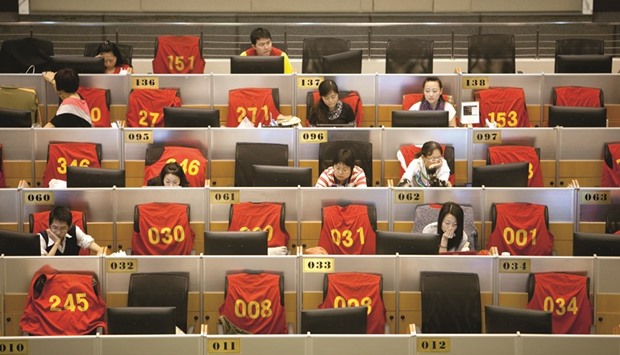China’s once again trying to restrain its commodity traders following a spike in prices from coal to rubber, six months after the government stepped in to deflate a speculative bubble.
The Shanghai Futures Exchange urged investors to trade rationally and maintain market stability amid an increase in volatility of some contracts. The bourse increased fees for steel and rubber futures Tuesday, while Zhengzhou Commodity Exchange raised charges for thermal coal for the fourth time in less than three weeks. Dalian Commodity Exchange hiked transaction fees for coking coal and coke.
It’s not the first time the nation’s commodity traders have been subdued. The exchanges took similar steps half a year ago when short-term retail investors charged into everything from iron ore to cotton, driving up prices and stoking fears of a bubble. While there hasn’t been the explosion in trading volumes seen across markets in April, the recent surge in coal, coke, rubber and steel has been enough to prompt authorities to take action.
“The government is compelled to regulate the market again as overplayed speculation in coking coal and coke futures attract liquidity in the country and spread enthusiasm to other products such as rebar and nickel and copper,” Wei Lai, an analyst at Cofco Futures, said by phone from Shanghai.
Thermal and coking coal futures have hit the highest level since their debut in 2013, while zinc surged to the highest since 2011. Steel rebar, nickel, tin, iron ore and rubber futures also jumped to multi-year highs.
Commodity trading is also drawing the scrutiny of the National Development and Reform Commission, the country’s top planner and price regulator. NDRC officials plan to meet with representatives of the Zhengzhou Commodity Exchange on Wednesday to discuss trading in thermal coal futures and efforts to curb illegal activity, according to people with knowledge of the plan.
Coal trading has been particularly volatile in recent weeks. Thermal coal futures in Zhengzhou fell 5% on Tuesday from the previous day’s settlement to 637 yuan per tonne, dropping by the daily limit. The exchange last week announced its third fee hike after previously increasing fees on October 24 and October 26. Coking coal on the DCE rose to a record last week. Trading volumes and the number of outstanding bets on ZCE rose to unprecedented levels last month as winter supply concerns prompted a jump in prices.
The government of President Xi Jinping is trying to cool coal prices by allowing some major miners to increase production after efforts by regulators earlier this year to cut supply sent prices soaring. The nation’s benchmark Qinhuangdao thermal coal price rose to an average of 700 yuan a tonne, the highest since June 2012, according to the China Coal Transport and Distribution Association. Meanwhile, spot seaborne metallurgical coal advanced to near $300 a metric tonne, according to The Steel Index.
“It shows that the government is determined to rein in coal prices and one of its measures is to curb speculative activity on the futures market,” Yu Jie, a Shanghai-based analyst with Galaxy Futures, said by phone. “In the near future, the thermal coal contract probably wouldn’t rise above the high reached on Monday.”
Zhengzhou will adjust transaction fees for same-day trading on thermal coal contracts to 30 yuan ($4.43), the exchange said in a statement on its website. It will charge an additional 30 yuan per contract on transactions with trading volume exceeding a certain level. Dalian will raise coking coal futures margin requirements by 11%, it said in a statement.

Traders work at the the Shanghai Futures Exchange. The exchange urged investors to trade rationally and maintain market stability amid an increase in volatility of some contracts.
